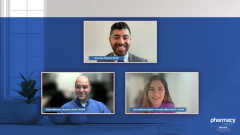
Bispecific Antibodies in DLBCL Trials
A panel delves into pivotal clinical trials leading to therapies approved for diffuse large B-cell lymphoma (DLBCL) and provide insights on trial design, patient cohorts, response rates, duration, and toxicity profiles highlight efficacy nuances.
Episodes in this series

This is a video synopsis/summary of a Practice Pearls involving Zahra Mahmoudjafari, PharmD, MBA, BCOP, FHOPA; Robert Mancini, PharmD; and Amir Ali, PharmD, BCOP, FHOPA.
In this discussion, Mahmoudjafari and Mancini review the clinical trials leading to the approval of epcoritamab and glofitamab therapies. Epcoritamab, based on the EPCORE NHL-1 trial, demonstrated a 63% overall response rate and an approximately 40% complete response rate, with a 12-month median duration of response. Glofitamab, from the NP30179 trial, showed a 52% overall response rate and a 39% complete response rate, with an 18.5-month median duration of response.
Both therapies raised questions about response rates in patients with prior chimeric antigen receptor T-cell therapy. Cytokine release syndrome (CRS) was a notable toxicity, with epcoritamab at 50% overall CRS and glofitamab at 70%. Neurotoxicity syndrome was rare, with 6% for epcoritamab and 8% for glofitamab. The focus remains on CRS, and further data is awaited to deepen understanding.
This summary was AI-generated and reviewed by Pharmacy Times® editorial staff.
Newsletter
Stay informed on drug updates, treatment guidelines, and pharmacy practice trends—subscribe to Pharmacy Times for weekly clinical insights.






















